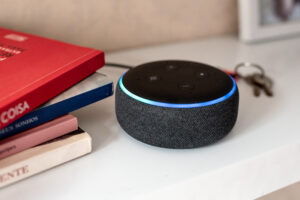They already help play music, get the news and control appliances at home, and virtual voice assistants may soon also be able to detect if people are ill.
Smart speakers such as Amazon’s Alexa or Google Assistant are expected within the decade to be able to spot oncoming colds and chronic health conditions before they appear by listening to a user’s breathing, voice and heart rate.
That is the prediction of a report from Vodafone into what consumer technology will look like by 2030. The mobile phone company believes that we will be wearing devices that allow us to control gadgets with our minds, have digitally connected trees analysing the air quality, and be staring into smart mirrors that can detect skin conditions.
The report, co-written with the consultancy the Future Laboratory, says that consumers will expect technology to be a key way they can monitor their health. It predicts that smart assistants will be able to spot early signs of diseases such as Parkinson’s from voice analysis alone, in a similar way to how temperature is an indicator of fever.
“Artificial intelligence embedded into your devices won’t just work to tell you when you become unwell, but will assess vital measurements in real time — including heart and respiratory rate, hydration, blood pressure and blood sugar levels — to predict and prevent chronic health conditions even before they appear,” the report states.
In 2018 it was revealed that Google had filed a patent for a smart speaker that could determine a speaker’s mood through the “volume of the user’s voice, detected breathing rate, crying and so forth”, and if they have a medical condition “based on detected coughing, sneezing and so forth”.
In January, at the Consumer Electronics Show, start-ups were offering lightbulbs that could monitor a person’s body temperature and floorboards that could analyse a user’s changing weight.
Martin Raymond, co-founder of the Future Laboratory, said that tech companies were working on smart mirrors that could detect changes in a user’s skin colour and send alerts to an accompanying app if it detected that the person should consult a doctor.
Such devices are also likely to connect with other wi-fi enabled appliances around the house as well as phones or smartwatches to build up a picture of somebody’s health, before sending health recommendations if needed.
The report says that by the end of the decade, using our voice to control devices will be “usurped” by mind-reading devices, embedded in technology such as smartwatches and headphones. These will detect the brain signals made when people say words in their head and give commands without people having to speak. In December last year, a 62-year-old man with motor neurone disease was the first person in the world to send a tweet via his thoughts, using a brain implant designed by the American-Australian company Synchron.
Neuralink, the brain reading company of Elon Musk, the Tesla car developer, released a video last April of a monkey playing video games with its mind via a chip implanted in its brain.
Facebook is creating a wrist device to read neurological signals from the brain to the hands to move objects in video games.
The report adds that as we reach 2030, “nature itself will become connected” with sensors on trees to analyse the environment and send the data to conservationists.
Read more:
Smart devices will let us control gadgets with our minds















